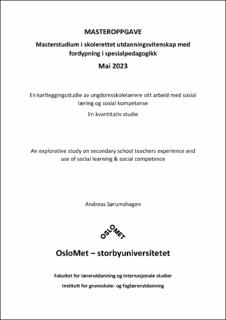| dc.description.abstract | Formål: Studien har til hensikt å kartlegge i hvilken grad lærere i ungdomsskolen søker å utvikle sosial kompetanse hos elevene gjennom arbeid med sosial læring. Studien undersøker om det eksisterer gruppeforskjeller innenfor ungdomsskolelæreres arbeid med sosial læring. Forskningsspørsmålene omhandler forskjeller mellom kommuner, skolestørrelse, kjønn, yrkeserfaring, skoletrinn og i hvilken omfang ungdomsskolelærerne i utvalget arbeider med sosial kompetanse. Teori: Den teoretiske tilnærmingen til studien tar først for seg plan- og styringsverk. Deretter presenteres barns tidlige sosiale utvikling til og med ungdomsalderen, før jeg går videre med å definere sosial kompetanse som begrep. Videre presenteres sosiale ferdigheter som inngår i sosial kompetanse, før viktigheten av sosial kompetanse hos barn og unge legges frem. Deretter presenteres noen strategier lærere kan bruke i arbeidet med sosial kompetanse. Avslutningsvis operasjonaliseres begrepet sosial kompetanse og til slutt presenteres forskning på feltet. Metode: For å besvare studiens problemstilling er kvantitativ metode benyttet, med et tverrsnittdesign. Utvalget består av 86 ungdomsskolelærere fra tre ulike kommunekategorier, storbykommune, randkommune og landkommune. Utvalget kommer fra 11 forskjellige ungdomsskoler, og datamaterialet er samlet inn gjennom et digitalt spørreskjema. Studiens empiri er etterprøvd med reliabilitetsanalyse. Resultater: De overordnede funnene i studien antyder at lærerne i utvalget arbeider i noen grad eller mer med sosial læring. Gruppesammenligning viser at det eksisterer signifikante forskjeller mellom kommunekategoriene landkommune og randkommune. Lærerne i landkommunen oppga at de arbeider mer med selvhevdelse enn lærerne i randkommunen. Det var også signifikante forskjeller mellom skolestørrelse. Lærerne som arbeider ved skoler med flere enn 357 elever oppga at de arbeider mer med empati enn lærerne som arbeider ved skoler med 300-348 elever. Lærerne i utvalget oppga også at de tror sosial læring som tema kan påvirke det psykososiale miljøet til elevene positivt, i noen grad eller i stor grad.
Purpose: The purpose of this study is to map the extent to which teachers in secondary schools seek to develop social competence in pupils, through work with social learning. This study examines whether group differences exist within the secondary school teachers’ work with social learning. The research questions deal with differences between municipalities, school size, gender, professional experience, school level and to what degree the teachers in the selection work with social competence. Theoretical framework: The theoretical approach to the study deals first with school management. Next, children's early social development up to and including adolescence is presented, before this study goes on to define social competence as a concept. Social skills that form part of social competence are presented, before the importance of social competence in children and adolescence along with strategies teachers can use in their work with social competence. Lastly the concept of social competence is operationalized and research in the field is presented. Methods: To best answer the study's research questions, a quantitative method with a cross-sectional design is used. The selection consists of 86 secondary school teachers from three different municipal categories, metropolitan municipalities, peripheral municipalities and rural municipalities. The sample comes from 11 different secondary schools, and the data was collected through a digital questionnaire. The study's empirical evidence has been verified with a reliability analysis. Results: The overall findings in this study suggest that the teachers in the selection work with social learning, but all to a different extent. Group comparison shows that there are significant differences between the municipal categories Rural and Marginal municipality. The teachers in the rural municipalities stated that they work more with self-assertion than the teachers in the peripheral municipalities. There were also significant differences between school sizes. The teachers who work at schools with 357> pupils stated that they work more with empathy than the teachers who work at schools with 300-348 pupils. The teachers in the sample also stated that they believe that social learning as a concept can positively influence the psychosocial environment of the pupils, to some extent or more. | en_US |
